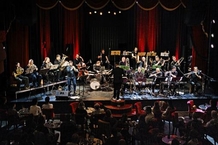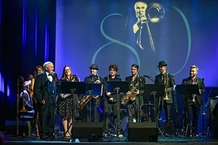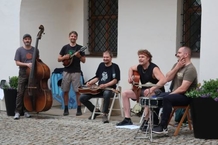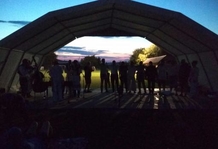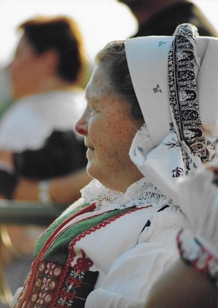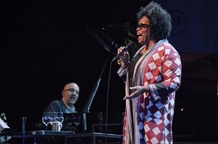Helena Bretfeldová
News
Feature articles
Nikol Bóková, a native of Ostrava, has long been considered a unique talent in the field of classical music. At the age of nine, she played as a solo pianist with the Janáček Philharmonic Orchestra, and studying at the conservatory and then at the JAMU was a matter of course. But already during her studies of classical music, another of her talents, that of composition, took shape and gradually manifested itself. Together with her trio (Nikol Bóková-piano, Martin Kocián-contrabass, Michal Wierzgoń-drums), she recorded her debut album Inner Place in 2019 and immediately established herself among the Czech (and indeed European) jazz elite. Two more projects followed during the cover – Unravel (2020) for the same named line-up and last year’s Prometheus, recorded with extraordinary commitment by a remarkable studio line-up. Out of this and several subsequent concerts (among others during JazzFest Brno last autumn) crystallized also the quite logical expansion of her trio with the versatile and empathetic guitarist David Dorůžka, the Nikol Bóková Quartet. This line-up was also the birthplace of the latest album Elements, with which a new creative phase opens for Nikol and her partner and co-creator Jan Vala. more
Another in a series of themed “anniversary” orchestral concepts by Jiří Kotača for his big band, this one commemorates the centenary of the birth of Canadian-American jazz pianist, composer, bandleader, and above all, genius arranger Gil Evans and his successful collaboration with legendary trumpeter Miles Davis in the late 1950s. more
Brno musicians are talented in various genres, and they’re generally long-lived and vital individuals. This was resoundingly clear during the jubilee celebration of Mojmír Bártek, a teacher, composer, arranger, and above all a virtuoso trombone player. The jubilee concert, dubbed Mojda Bártek 80, was prepared by his friends under the direction of B-Side Band trumpeter and bandleader Josef Buchta. Despite the birthday boy’s open and (sometimes emotional) enjoyment of the two and a half hour program, he still remained an active participant of the entire musical production except for brief moments of rest. He performed as the author of many compositions, but above all as a player, trombone in hand and fully committed. more
One of the few positives of the otherwise tormented musical year 2020 is the unusually rich Czech jazz harvest: sixty (!) albums and projects either purely jazz or significantly affected by jazz were released last year. Many of the most highly acclaimed ones are connected to Brno in various ways – for example, the debut Bigbandová elektronika (Bigband Electronica) by the increasingly prominent Cotatcha Orchestra and the ensemble’s second album Dust in the Groove, testing the boundaries of classical music and jazz through refined improvisation. more
Hajcman, a tramp-swing group with its roots in Brno, released their expected debut album Jednou to bude (It Will Come to Pass). The band’s name, derived from the Czech word for a supporting steel frame in coal mining, is a reference to cave exploring, the hobby of the group’s leader Martin Škrobák, whose first band was called Stalaktit (Stalactite). While the album largely showcases the talents of the tramping legend, it does feature a sample of the band’s work in the form of two songs by Martin, hinting at the direction of the band’s future album of author's songs. It’s Jaroslav Velinský aka Kapitán Kid who is the author of the most of the debut’s collection of songs, the result of over a decade’s effort. An old friend of Martin’s, as well as a fellow musician and inspiration to him, the tramping music king Kapitán Kid had planned to record some “blasts from the past” in 2005 with his previous outfit the Banjo Gang, as described in the sleeve notes and associated songbook. Joint recording sessions with Martin and his friends took place subsequently, but Velinský’s best-known tramping songs from the CD Tempo di kůň (Tempo de Horse; released in 2007) were eventually preferred. This is how these tracks came to be short-listed, with the blessing of Kapitán Kid himself, and recorded just a few years after the songwriter’s death, making it essentially a tribute to him. more
The municipal council of Velká nad Veličkou decided already in mid-April that this year's Horňácké Festivities (original name: Horňácké slavnosti) would not take place on the traditional dates around the feast of St. Mary Magdalene, and their scope, previously meant to be of three to five days, would also be modified. Obviously, it was impossible to foresee the development of lockdown measures towards the third week of July, but musicians from the Horňácko district tried to come up with at least a partial alternative solution in order to maintain continuity. Eventually, two concerts were officially held on two consecutive Saturdays: On 18 July, live broadcast of a public radio recording of Czech Radio Brno under the title Hrajte že ně, hrajte aneb Horňácké trochu jinak (Play for Me, or Horňácké Festivities in a Slightly Different Fashion) took place at the Culture House in Velká nad Veličkou. A week later, at a sports complex in Javorník, a traditional competition for "the biggest expert on Horňácko peasant songs" was held under the auspices of the Horňácko Dulcimer Band of Libor Sup. Needless to say, both events have found their spectators and listeners. more
On the twenty-fourth of May of this year, five days before her ninety-second birthday, Mrs. Anna Kománková passed away – and with her departed her particularly extensive songbook of ballads (not only) from the Javornicko and Horňácko districts, which she had always carried in her head. She was able to perform all the songs conserved in her memory in a distinctive and inimitable style. All her life she safeguarded the rare legacy of her ancestral heritage – all the more interestingly because she did not write down the hundreds of often complicated tunes and many dozens of verses and variants of ballads, but she knew them all by heart. Even after she reached the age of ninety, when she no longer enjoyed good health and did not perform in public, she remained in contact with the Javornický ženský sbor [Javorník Women's Choir], which she had revived and eventually led for many years. She never pushed herself forward anywhere, while at the same time she learned a lot from the skills of her ancestors: apart from singing (dozens of songs from the hymn-book and hundreds of folklore songs) she was an excellent embroiderer: She sewed and embroidered with her own hands every part of the folk costume she wore. more
When pronouncing the name Jiří ‘moravský’ Brabec (1955-2018) (the name is partly a pun referring to a typical Moravian dish called "moravský vrabec", which is pork roast with braised cabbage and dumplings – translator's note), anyone, who until recently had any business concerning the Czech-Moravian folk and country scene, is reminded of the unmistakeable figure of a mighty man wearing a beard, with a strong voice and an inexhaustible source of information, and an enviable general knowledge of not only the above-mentioned music genre. We are speaking here about a complicated but deservedly respected personality who was able to surprise us with his knowledge in a number of disciplines, but also with his self-deprecating humour and unexpected physical dexterity. Unfortunately, for the last time he surprised people around him with his sudden departure, only a few days before his sixty-third birthday in June 2018, almost unnoticed by the public media, for which he had worked for so many years. more
This year's Jazzman, a fanzine of the JazzFest music festival, was full of extensive medallions and articles and also featured a noteworthy commentary by the Czech Radio's dramaturge Petr Vidomus with a somewhat provocative headline: Jazz Doesn't Need to Be a Men's Club. The article contemplates some of the gender stereotypes, which the world (and therefore consequently not even the Czech) jazz scene has not yet gotten rid of completely. Great female soloists, mastering instruments previously entirely reserved for men, are growing in numbers. Although gender coding, which Vidomus described in a very precise and ironic way, has not yet been completely overcome, JazzFest contributed significantly to its gradual elimination this year. more
As part of this year’s European Tour, Bobby McFerrin visited Brno’s Sono Centre, where he managed to perfectly use the brilliant acoustics and the close contact with the audience. The legend is back. Indeed, he comes back regularly, and not just to Brno. more






